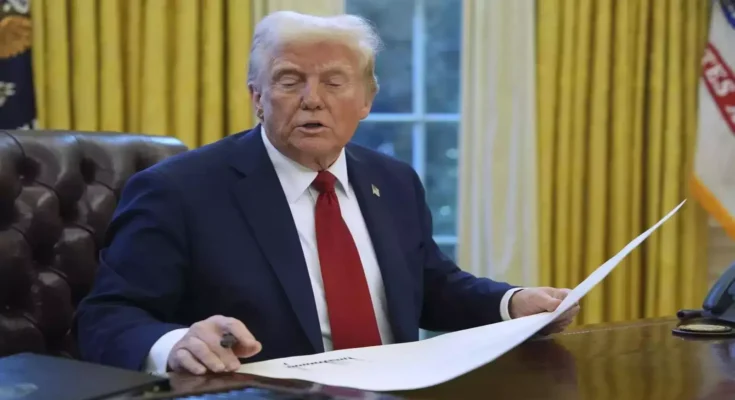For the first time since January, the price of bitcoin fell below $100,000, hitting a low of $92,460.
Crypto investors reduced their risk after Donald Trump imposed fresh taxes on imports from China, Canada, and Mexico over the weekend.
Ether, the second-largest digital asset in the world, consequently fell as much as 26.53% to $2,135 on Monday. Notably, this was the biggest intraday percentage decline since May 2021 and the steepest loss in almost four years.
By signing an executive order imposing new tariffs on these nations, Trump increased tensions on a global scale. Trump has consistently threatened this action, which marks a significant change. Each nation has pledged additional counteractions in the intense diplomatic conflict it has sparked.
Fears of a Trade War Cause a Massive Crypto Sell-Off
As a result, the price of Bitcoin fell precipitously, falling below $100,000 for the first time since early January and to a low of $92,460. This drop was a component of a larger market sell-off as investors turned to safer assets due to concerns about inflation and the trade war’s impact on the economy.
Other cryptocurrencies also experienced a decline: Dogecoin saw a 24.5% decline, Solana saw a 7.5% decline, and XRP lost 23% of its value. Crypto traders aggressively decreased their holdings in a variety of tokens in reaction to Trump’s tariffs.
According to CoinGlass statistics, more than $2 billion in Bitcoin liquidations occurred right after the tariff announcement. Both long and short positions were included in these liquidations. But a startling $1.83 billion came from long liquidations, showing that the market’s sudden decline had an unanticipated effect on bullish traders.
Problems with International Trade Reduce Demand for Bitcoin and Other Cryptocurrencies
Tariffs impede international trade and restrict economic expansion, which lowers consumer spending and disposable income. Because of this, investors frequently have less money to invest in cryptocurrencies. Furthermore, certain trade policies have the potential to strengthen the US currency, which would raise the price of Bitcoin and other dollar-priced assets for foreign buyers and, as a result, reduce demand.
Furthermore, there is now a closer connection between cryptocurrencies and conventional financial markets. As a result, when trade tensions lead to stock fluctuations or declines, cryptocurrency prices usually follow suit, reflecting a shift in investor mood.
Analysts Discuss Short-Term Turbulence vs. Long-Term Gains
There is still disagreement among analysts over the long-term effects. According to some forecasts, the tariffs may eventually help Bitcoin by depreciating the currency and lowering US interest rates. On the other hand, some caution that the trade war may cause market declines and immediate inflationary pressures.
Markus Thielen of 10X Research pointed out that while Bitcoin was on the verge of a breakout on Friday, the market pulled back when Trump signed and enacted the first wave of tariffs.
Furthermore, Thielen clarified that even if the market had mostly factored in Trump’s tariffs on February 1st, their implementation nonetheless halted the Bitcoin rise and put important technical support levels in jeopardy.
Investors were also aware of the tariffs, but they had underestimated the geopolitical response and the possibility of retaliatory actions from foreign governments since they had been preoccupied with the DeepSeek story.
According to Ryan Lee, chief analyst of Bitget Research, “Although Bitcoin has long been thought of as a hedge against conventional market volatility, its recent performance shows that it is becoming more sensitive to happenings in the world economy.” “The current response demonstrates how policy decisions and geopolitical tensions are increasingly influencing the dynamics of the cryptocurrency market.”



